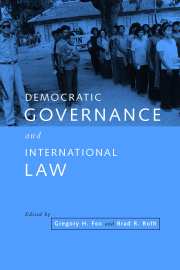Book contents
- Frontmatter
- Contents
- List of contributors
- List of acknowledgments
- Introduction: the spread of liberal democracy and its implications for international law
- PART I THE NORMATIVE FOUNDATIONS OF A RIGHT TO POLITICAL PARTICIPATION
- PART II DEMOCRACY AND INTER-STATE RELATIONS
- PART III DEMOCRACY AND THE USE OF FORCE
- PART IV DEMOCRATIZATION AND CONFLICTING IMPERATIVES
- PART V CRITICAL APPROACHES
- 17 Evaluating democratic progress
- 18 What kind of democracy does the “democratic entitlement” entail?
- 19 International law, democracy, and the end of history
- Index
17 - Evaluating democratic progress
Published online by Cambridge University Press: 04 May 2010
- Frontmatter
- Contents
- List of contributors
- List of acknowledgments
- Introduction: the spread of liberal democracy and its implications for international law
- PART I THE NORMATIVE FOUNDATIONS OF A RIGHT TO POLITICAL PARTICIPATION
- PART II DEMOCRACY AND INTER-STATE RELATIONS
- PART III DEMOCRACY AND THE USE OF FORCE
- PART IV DEMOCRATIZATION AND CONFLICTING IMPERATIVES
- PART V CRITICAL APPROACHES
- 17 Evaluating democratic progress
- 18 What kind of democracy does the “democratic entitlement” entail?
- 19 International law, democracy, and the end of history
- Index
Summary
INTRODUCTION
The post-Cold-War world has been marked by a series of astonishing changes, many of which have involved openings to popular participation in politics. These openings have occurred in the name of democracy, and have made use of familiar institutional mechanisms of electoral competition. Much recent academic literature has rushed to embrace these events. In the exuberance of the moment, issues become conflated, and differences regarding crucial principles are obscured.
Democracy – or at least something bearing that name – is now commonly asserted as a global norm. Increasingly jettisoned are long-held theories about the historical peculiarity of democracy, theories emphasizing structural prerequisites or cultural dispositions present almost exclusively in developed Western countries. Whether or not the new trend's enthusiasts are possessed of sufficient rhetorical audacity to proclaim a liberal–democratic “end of history” (in some Hegelian sense), they do appear satisfied on two crucial points: first, that a democratic reality has in fact come to pass in so much of the world as to refute claims of the norm's limited applicability; and second, that the superiority of this “actually existing democracy” over all alternatives is so firmly established that, in normative terms, nothing remains to be discussed. Some have gone so far as to assert an “emerging right to democratic governance” in international law, thereby linking the legitimacy of governments to “free and fair” competitive electoral processes.
- Type
- Chapter
- Information
- Democratic Governance and International Law , pp. 493 - 516Publisher: Cambridge University PressPrint publication year: 2000
- 2
- Cited by



